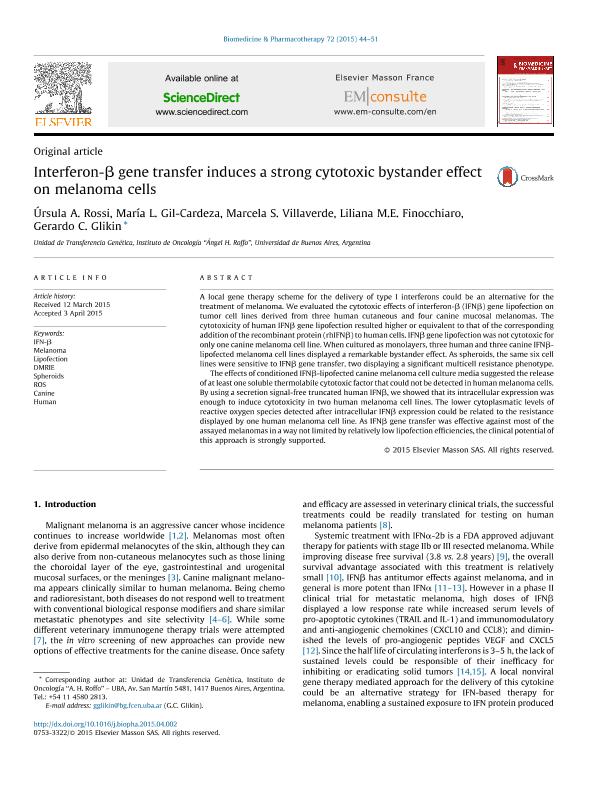Artículo
Interferon-β gene transfer induces a strong cytotoxic bystander effect on melanoma cells
Rossi, Ursula Amaranta ; Gil Cardeza, Maria Lourdes
; Gil Cardeza, Maria Lourdes ; Villaverde, Marcela Solange
; Villaverde, Marcela Solange ; Finocchiaro, Liliana Maria Elena
; Finocchiaro, Liliana Maria Elena ; Glikin, Gerardo Claudio
; Glikin, Gerardo Claudio
 ; Gil Cardeza, Maria Lourdes
; Gil Cardeza, Maria Lourdes ; Villaverde, Marcela Solange
; Villaverde, Marcela Solange ; Finocchiaro, Liliana Maria Elena
; Finocchiaro, Liliana Maria Elena ; Glikin, Gerardo Claudio
; Glikin, Gerardo Claudio
Fecha de publicación:
05/2015
Editorial:
Elsevier France-editions Scientifiques Medicales Elsevier
Revista:
Biomedicine & Pharmacotherapy = Biomedecine & Pharmacotherapie
ISSN:
0753-3322
Idioma:
Inglés
Tipo de recurso:
Artículo publicado
Clasificación temática:
Resumen
A local gene therapy scheme for the delivery of type I interferons could be an alternative for the treatment of melanoma. We evaluated the cytotoxic effects of interferon-β (IFNβ) gene lipofection on tumor cell lines derived from three human cutaneous and four canine mucosal melanomas. The cytotoxicity of human IFNβ gene lipofection resulted higher or equivalent to that of the corresponding addition of the recombinant protein (rhIFNβ) to human cells. IFNβ gene lipofection was not cytotoxic for only one canine melanoma cell line. When cultured as monolayers, three human and three canine IFNβ-lipofected melanoma cell lines displayed a remarkable bystander effect. As spheroids, the same six cell lines were sensitive to IFNβ gene transfer, two displaying a significant multicell resistance phenotype.The effects of conditioned IFNβ-lipofected canine melanoma cell culture media suggested the release of at least one soluble thermolabile cytotoxic factor that could not be detected in human melanoma cells. By using a secretion signal-free truncated human IFNβ, we showed that its intracellular expression was enough to induce cytotoxicity in two human melanoma cell lines. The lower cytoplasmatic levels of reactive oxygen species detected after intracellular IFNβ expression could be related to the resistance displayed by one human melanoma cell line. As IFNβ gene transfer was effective against most of the assayed melanomas in a way not limited by relatively low lipofection efficiencies, the clinical potential of this approach is strongly supported.
Palabras clave:
Canine
,
Dmrie
,
Human
,
Ifn-Β
,
Lipofection
,
Melanoma
,
Ros
,
Spheroids
Archivos asociados
Licencia
Identificadores
Colecciones
Articulos(OCA HOUSSAY)
Articulos de OFICINA DE COORDINACION ADMINISTRATIVA HOUSSAY
Articulos de OFICINA DE COORDINACION ADMINISTRATIVA HOUSSAY
Citación
Rossi, Ursula Amaranta; Gil Cardeza, Maria Lourdes; Villaverde, Marcela Solange; Finocchiaro, Liliana Maria Elena; Glikin, Gerardo Claudio; Interferon-β gene transfer induces a strong cytotoxic bystander effect on melanoma cells; Elsevier France-editions Scientifiques Medicales Elsevier; Biomedicine & Pharmacotherapy = Biomedecine & Pharmacotherapie; 72; 5-2015; 44-51
Compartir
Altmétricas



